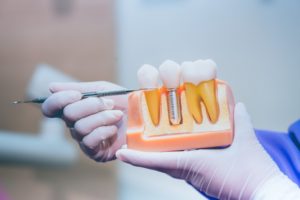
Your fuel gauge is on “E,” but you’ve got to get to the bank before it closes, and you never run out of gas. The gauge always shows less fuel than you really have, right?
You pass up the gas station, just a couple more miles to the bank and…oh my goodness, you actually ran out of gas! This isn’t supposed to happen in real life, is it?
It’s a similar situation with your dental implants. They have a success rate greater than 90 percent, but you need to know how to take care of them to avoid dental implant failure and be able to recognize if it happens.
Keep reading to see how you can avoid difficulties with your dental implants while also being prepared for the unexpected.
What are the Components of a Dental Implant?
It’s important to understand the parts of a dental implant. Most of them have a titanium implant body inserted into the jawbone, an attachment called an abutment, and a crown, bridge, or denture that is fixed to the abutment and aligned with your remaining teeth.
During the biological process of osseointegration, your body produces living bone cells that grow around the implant surface and anchor it to your jawbone.
How Do You Know if Your Dental Implant Failed?
If your implant has mobility, it could mean your bone didn’t grow properly around the implant. The movement may be so slight at first that only your dentist can detect it, but a failed implant won’t be anchored in place.
Your dentist may recommend an X-ray to check your bone growth if your implant is mobile. An X-ray of a failed implant will probably show substantial loss of bone around the metal portion. Other signs your implant is compromised include pain, swelling, or infection.
What Factors Impact the Success of Dental Implants?
Even though failure is rare, there are quite a few reasons a dental implant could have complications:
- Gum disease: You cannot have a dental implant procedure with active gum disease, so if you develop it before or after getting the implant, you are at risk.
- Smoking: Smoking restricts blood flow to the gums and slows the healing process. Being a smoker doesn’t make you ineligible for dental implants, but the failure rate rises to 20 percent.
- Insufficient jawbone: Without enough healthy bone, your surgeon can’t place the implant into your jaw. Reasons for bone loss may include osteoporosis or severe gum disease.
- Medical conditions: If you have rheumatoid arthritis, diabetes, or an autoimmune disease, your body likely heals at a slower pace and that can prevent osseointegration. Certain medications can also cause implant failure.
- Poor dental maintenance: The ability to practice good oral hygiene before and after getting dental implants is crucial.
- Inexperienced surgeon: An experienced surgeon knows how many implants to use to support tooth replacement. Too few implants can cause excessive stress on the implant and then failure.
Hopefully, being aware of potential complications can help you steer clear of implant failure.
If you’re struggling with tooth loss, dental implants could be exactly what your smile needs. However, it’s important to know the signs of dental implant failure and the preventive steps you can take. Fortunately, your dentist will assess the risk factors and your candidacy before surgery!
About the Author
Dr. Todd Balington enjoys all aspects of restorative dentistry. When it comes to dental implants, at Denton Dental Center we have multiple options. We offer implant dentures for a more natural feel and function, as well as All-On-4 dental implants that don’t require the jawbone mass of traditional implant dentures. Visit our website to schedule a consultation or call (940) 383-3300.
